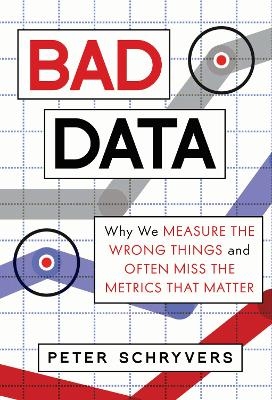
Bad Data
Why We Measure the Wrong Things and Often Miss the Metrics That Matter
Seiten
2020
Prometheus Books (Verlag)
978-1-63388-590-5 (ISBN)
Prometheus Books (Verlag)
978-1-63388-590-5 (ISBN)
- Titel nicht im Sortiment
- Artikel merken
Highlights the pitfalls of data analysis and emphasizes the importance of using the appropriate metrics before making key decisions.
Big data is often touted as the key to understanding almost every aspect of contemporary life. This critique of "information hubris" shows that even more important than data is finding the right metrics to evaluate it.
The author, an expert in environmental design and city planning, examines the many ways in which we measure ourselves and our world. He dissects the metrics we apply to health, worker productivity, our children's education, the quality of our environment, the effectiveness of leaders, the dynamics of the economy, and the overall well-being of the planet. Among the areas where the wrong metrics have led to poor outcomes, he cites the fee-for-service model of health care, corporate cultures that emphasize time spent on the job while overlooking key productivity measures, overreliance on standardized testing in education to the detriment of authentic learning, and a blinkered focus on carbon emissions, which underestimates the impact of industrial damage to our natural world.
He also examines various communities and systems that have achieved better outcomes by adjusting the ways in which they measure data. The best results are attained by those that have learned not only what to measure and how to measure it, but what it all means.
By highlighting the pitfalls inherent in data analysis, this illuminating book reminds us that not everything that can be counted really counts.
Big data is often touted as the key to understanding almost every aspect of contemporary life. This critique of "information hubris" shows that even more important than data is finding the right metrics to evaluate it.
The author, an expert in environmental design and city planning, examines the many ways in which we measure ourselves and our world. He dissects the metrics we apply to health, worker productivity, our children's education, the quality of our environment, the effectiveness of leaders, the dynamics of the economy, and the overall well-being of the planet. Among the areas where the wrong metrics have led to poor outcomes, he cites the fee-for-service model of health care, corporate cultures that emphasize time spent on the job while overlooking key productivity measures, overreliance on standardized testing in education to the detriment of authentic learning, and a blinkered focus on carbon emissions, which underestimates the impact of industrial damage to our natural world.
He also examines various communities and systems that have achieved better outcomes by adjusting the ways in which they measure data. The best results are attained by those that have learned not only what to measure and how to measure it, but what it all means.
By highlighting the pitfalls inherent in data analysis, this illuminating book reminds us that not everything that can be counted really counts.
Peter Schryvers is a senior planner for the City of Calgary and is the founder of the Beltline Urban Mural Project. A Registered Planning Professional with a master's in Environmental Design, he is a member of the Canadian Institute of Planners.
| Erscheinungsdatum | 24.09.2021 |
|---|---|
| Sprache | englisch |
| Maße | 165 x 233 mm |
| Gewicht | 671 g |
| Themenwelt | Mathematik / Informatik ► Informatik ► Datenbanken |
| Wirtschaft ► Allgemeines / Lexika | |
| Wirtschaft ► Betriebswirtschaft / Management | |
| Wirtschaft ► Volkswirtschaftslehre ► Ökonometrie | |
| ISBN-10 | 1-63388-590-9 / 1633885909 |
| ISBN-13 | 978-1-63388-590-5 / 9781633885905 |
| Zustand | Neuware |
| Haben Sie eine Frage zum Produkt? |
Mehr entdecken
aus dem Bereich
aus dem Bereich
Einführung in die Praxis der Datenbankentwicklung für Ausbildung, …
Buch | Softcover (2021)
Springer Fachmedien Wiesbaden GmbH (Verlag)
CHF 69,95


